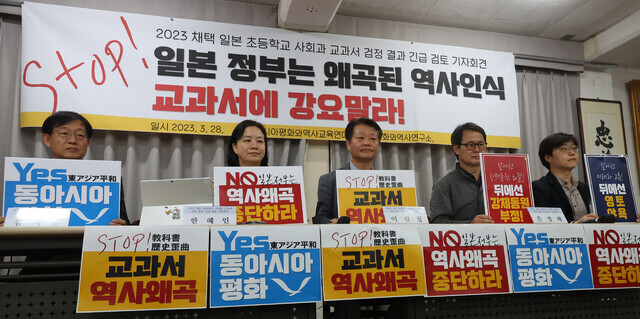hankyoreh
Links to other country sites 다른 나라 사이트 링크
[Editorial] Yoon’s white flag on historical disputes with Japan backfires immediately

Japanese elementary school textbooks will explain in less detail the coercive nature of Japan’s colonial-era forced mobilization of Koreans, and will further the historically inaccurate claim that Dokdo is Japanese territory.
This is the result of President Yoon Suk-yeol’s “all-surrendering” diplomacy, in which South Korea moved to compensate the victims of forced mobilization domestically and expectantly wait for a gesture of good faith from Japan. This only reinforces the reality that if we give in to Japan first, Japan will not reciprocate graciously.
The problem is that this feels like it is only the beginning, not the end.
Japan’s Ministry of Education, Culture, Sports, Science and Technology announced on Tuesday the results of a review of elementary school textbooks to be used in 2024. The descriptions of victims of forced labor in the social studies textbooks are even shabbier than the editions reviewed in 2019.
The words “volunteering” was added to describe Korean youths who became soldiers, emphasizing that their “conscription” was voluntary, not forced. Baseless territorial claims calling Dokdo “Japanese territory” that is being “illegally occupied by South Korea” also appear in almost all the textbooks. Japan’s indoctrination of young students with these misleading claims casts a dark shadow over the future of South Korea-Japan relations.
In a statement from the Ministry of Foreign Affairs, the South Korean government expressed “deep regret” and said that it “strongly protests” such acts, but these words ring hollow. Japan has distorted history textbooks since the past, and the South Korean government’s response has always been similar.
However, since Yoon rushed to exonerate Japan of its historical sins in hopes of gaining Tokyo’s favor, he is now in a difficult position to respond. The administration’s “solution” announced on March 6 directly contradicts the Supreme Court’s ruling and accepts Japan’s claim that forced mobilization was “routine labor mobilization, and nothing about it was illegal or coercive.”
Yoon has also publicly stated that “he sympathizes with Japan’s point of view” in response to Japan’s revision of its National Security Strategy, which claims Dokdo as Japan’s sovereign territory. The distortion of history in these textbooks is only made more painful because it has been brought about by the fact that Yoon gave Japan to claim its stakes on Dokdo, and then abandoned the principle of diplomacy to respond to Japan’s unjust actions.
This disheartening reality is far from the self-congratulatory claims of the “improvement” of bilateral relations brought around by the South Korea-Japan summit. It is likely that Japan will continue to demand unilateral concessions on issues regarding the “comfort women” system, the dumping of contaminated water from the Fukushima nuclear meltdown, a 2018 incident in which a South Korean vessel allegedly radar locked onto a Japanese aircraft — and that South Korea will humiliatingly give in.
Please direct questions or comments to [english@hani.co.kr]

Editorial・opinion
![[Editorial] Penalties for airing allegations against Korea’s first lady endanger free press [Editorial] Penalties for airing allegations against Korea’s first lady endanger free press](https://flexible.img.hani.co.kr/flexible/normal/500/300/imgdb/original/2024/0502/1817146398095106.jpg) [Editorial] Penalties for airing allegations against Korea’s first lady endanger free press
[Editorial] Penalties for airing allegations against Korea’s first lady endanger free press![[Editorial] Yoon must halt procurement of SM-3 interceptor missiles [Editorial] Yoon must halt procurement of SM-3 interceptor missiles](https://flexible.img.hani.co.kr/flexible/normal/500/300/imgdb/child/2024/0501/17145495551605_1717145495195344.jpg) [Editorial] Yoon must halt procurement of SM-3 interceptor missiles
[Editorial] Yoon must halt procurement of SM-3 interceptor missiles- [Guest essay] Maybe Korea’s rapid population decline is an opportunity, not a crisis
- [Column] Can Yoon steer diplomacy with Russia, China back on track?
- [Column] Season 2 of special prosecutor probe may be coming to Korea soon
- [Column] Park Geun-hye déjà vu in Yoon Suk-yeol
- [Editorial] New weight of N. Korea’s nuclear threats makes dialogue all the more urgent
- [Guest essay] The real reason Korea’s new right wants to dub Rhee a founding father
- [Column] ‘Choson’: Is it time we start referring to N. Korea in its own terms?
- [Editorial] Japan’s rewriting of history with Korea has gone too far
Most viewed articles
- 1[Editorial] Penalties for airing allegations against Korea’s first lady endanger free press
- 260% of young Koreans see no need to have kids after marriage
- 3Months and months of overdue wages are pushing migrant workers in Korea into debt
- 4Bills for Itaewon crush inquiry, special counsel probe into Marine’s death pass National Assembly
- 5[Reporter’s notebook] In Min’s world, she’s the artist — and NewJeans is her art
- 61 in 3 S. Korean security experts support nuclear armament, CSIS finds
- 7S. Korea discusses participation in defense development with AUKUS alliance
- 8[Guest essay] Maybe Korea’s rapid population decline is an opportunity, not a crisis
- 9[Editorial] Yoon must halt procurement of SM-3 interceptor missiles
- 10Cracks found in containment building of UAE nuclear power plant built by S. Korean companies